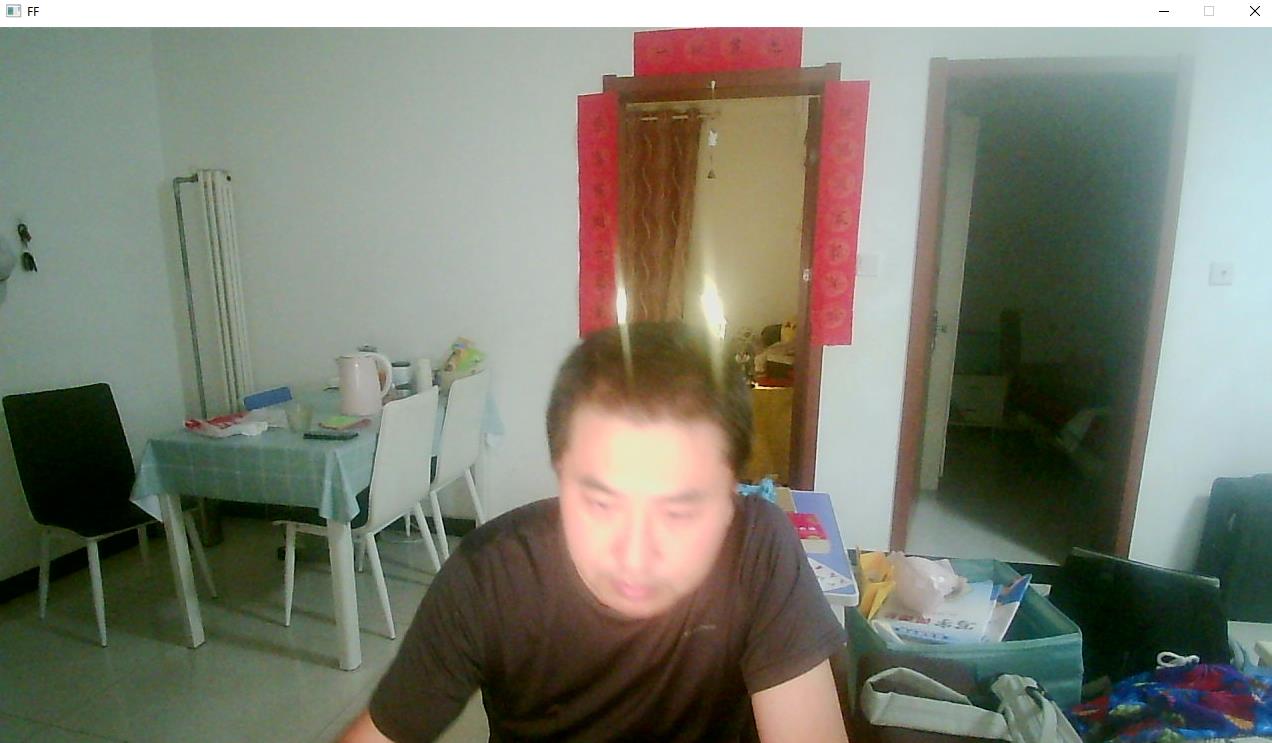sdl2和ffmpeg显示摄像头数据
Posted qianbo_insist
tags:
篇首语:本文由小常识网(cha138.com)小编为大家整理,主要介绍了sdl2和ffmpeg显示摄像头数据相关的知识,希望对你有一定的参考价值。

当我们按下空格键的时候,视频可以暂停。
ffmpeg 封装摄像头
extern "C" {
#include <libavcodec/avcodec.h>
#include <libavdevice/avdevice.h>
#include <libavutil/imgutils.h>
#include <libswscale/swscale.h>
}
#include <string>
using namespace std;
//#define OUTPUT_YUV420P 0
class TFFCap
{
public:
int m_fps = 10;
AVFrame * m_pFrame = NULL;
AVFrame * m_pFrameDst = NULL;
string m_name;
uint8_t * out_buffer = NULL;
int m_videoIndex = -1;
struct SwsContext * m_img_convert_ctx = NULL;
//int _pixelW;
//int _pixelH;
private:
AVFormatContext * m_pFormatCtx = NULL;
AVCodecContext * m_pCodecCtx = NULL;
AVCodec * m_pCodec = NULL;
AVPacket * m_pkt = NULL;
public:
void Init()
{
avdevice_register_all();
}
int OpenCameraRGB(const char * utf8videoname,
int nWidth, int nHeight);
uint8_t *QueryFrame();
int m_w = 0;
int m_h = 0;
// int QueryFrame(uint8_t *buf, int *len);
void UnInit();
TFFCap();
~TFFCap();
};
#include "FFCap.h"
#include <stdio.h>
#include <sstream>
using namespace std;
TFFCap::TFFCap()
{
}
TFFCap::~TFFCap()
{
}
static AVDictionary *GetOptions(int videosize, int &fps)
{
AVDictionary *options = NULL;
switch (videosize)
{
case 1:
{
fps = 10;
av_dict_set(&options, "video_size", "1280x720", 0);
//const char * fname = av_get_pix_fmt_name((AVPixelFormat)13);
//av_dict_set(&options, "pixel_format", fname, 0);
av_dict_set_int(&options, "framerate", 10, 0);
av_dict_set_int(&options, "rtbufsize", 2764800 / 10, 0);
av_dict_set(&options, "start_time_realtime", 0, 0);
//av_dict_set(&options, "mjpeg", 0, 0);
}
break;
case 2:
fps = 20;
av_dict_set_int(&options, "framerate", 30, 0);
av_dict_set(&options, "video_size", "640x480", 0);
av_dict_set_int(&options, "rtbufsize", 640 * 480 * 3 / 15, 0);
break;
case 3:
fps = 20;
av_dict_set_int(&options, "framerate", 30, 0);
av_dict_set(&options, "video_size", "320x240", 0);
av_dict_set_int(&options, "rtbufsize", 76800 / 10, 0);
break;
case 4:
fps = 20;
av_dict_set_int(&options, "framerate", 30, 0);
av_dict_set(&options, "video_size", "176x144", 0);
//av_dict_set_int(&options, "rtbufsize", 76800 / 10, 0);
break;
}
av_dict_set(&options, "start_time_realtime", 0, 0);
return options;
}
int TFFCap::OpenCameraRGB(const char * utf8videoname,
int w, int h)
{
av_log_set_level(AV_LOG_FATAL);
AVInputFormat *ifmt = nullptr;
AVDictionary *options = NULL;
string oldname = m_name;
m_name = "video=";
m_name += utf8videoname;
if (oldname.compare(m_name) != 0)
{
avcodec_close(m_pCodecCtx);
avcodec_free_context(&m_pCodecCtx);
m_pCodecCtx = NULL;
avformat_close_input(&m_pFormatCtx);
m_pFormatCtx = NULL;
}
else
{
if (m_w == w && m_h == h)
return 0;
avcodec_free_context(&m_pCodecCtx);
m_pCodecCtx = NULL;
avformat_close_input(&m_pFormatCtx);
m_pFormatCtx = NULL;
}
if (m_pFormatCtx == NULL)
{
m_pFormatCtx = avformat_alloc_context();
ifmt = av_find_input_format("dshow");
}
m_pFormatCtx->flags |= AVFMT_FLAG_NOBUFFER;
av_dict_set(&options, "start_time_realtime", 0, 0);
switch (w)
{
case 1920:
break;
case 1280:
m_fps = 10;
av_dict_set(&options, "video_size", "1280x720", 0);
//av_dict_set_int(&options, "framerate", 10, 0);
av_dict_set_int(&options, "rtbufsize", 2764800 / 10, 0);
break;
case 640:
m_fps = 20;
av_dict_set_int(&options, "framerate", 30, 0);
av_dict_set(&options, "video_size", "640x480", 0);
av_dict_set_int(&options, "rtbufsize", 640 * 480 * 3 / 15, 0);
break;
case 320:
m_fps = 20;
av_dict_set_int(&options, "framerate", 30, 0);
av_dict_set(&options, "video_size", "320x240", 0);
av_dict_set_int(&options, "rtbufsize", 76800 / 10, 0);
break;
case 176:
m_fps = 20;
av_dict_set_int(&options, "framerate", 30, 0);
av_dict_set(&options, "video_size", "176x144", 0);
av_dict_set_int(&options, "rtbufsize", 76800 / 10, 0);
break;
}
if (avformat_open_input(&m_pFormatCtx, m_name.c_str(), ifmt, &options) != 0)
{
return -1;
}
if (avformat_find_stream_info(m_pFormatCtx, NULL) < 0)
{
//std::cout << "avformat find stream info failed." << std::endl;
return -1;
}
for (uint32_t i = 0; i < m_pFormatCtx->nb_streams; i++)
{
if (m_pFormatCtx->streams[i]->codecpar->codec_type == AVMEDIA_TYPE_VIDEO)
{
//AVPixelFormat avf = (AVPixelFormat)m_pFormatCtx->streams[i]->codecpar->format;
//const char* strfmt = av_get_pix_fmt_name(avf);
//w = m_pFormatCtx->streams[i]->codecpar->width;
//h = m_pFormatCtx->streams[i]->codecpar->height;
m_videoIndex = i;
break;
}
}
if (-1 == m_videoIndex)
{
return -1;
}
if(m_pCodecCtx == NULL)
m_pCodecCtx = avcodec_alloc_context3(NULL);
if (m_pCodecCtx == NULL)
{
return -1;
}
avcodec_parameters_to_context(m_pCodecCtx, m_pFormatCtx->streams[m_videoIndex]->codecpar);
m_pCodec = avcodec_find_decoder(m_pCodecCtx->codec_id);
if (m_pCodec == NULL)
{
//std::cout << "AVCodec not found." << std::endl;
return -1;
}
if (avcodec_open2(m_pCodecCtx, m_pCodec, NULL) < 0)
{
//std::cout << "codec open failed." << std::endl;
return -1;
}
if(m_pFrame == NULL)
m_pFrame = av_frame_alloc();
if(m_pFrameDst == NULL)
m_pFrameDst = av_frame_alloc();
if(m_pkt == NULL)
m_pkt = av_packet_alloc();
AVPixelFormat avpf = AV_PIX_FMT_BGR24; // AV_PIX_FMT_YUV420P; //AV_PIX_FMT_BGR24
if (m_w != w || m_h != h)
{
if (out_buffer != NULL)
delete []out_buffer;
}
if (out_buffer == NULL)
{
out_buffer = (unsigned char *)av_malloc(av_image_get_buffer_size(avpf,
w,
h,
1));
av_image_fill_arrays(m_pFrameDst->data, m_pFrameDst->linesize, out_buffer,
avpf, w, h, 1);
}
m_img_convert_ctx =
sws_getCachedContext(m_img_convert_ctx,
w, h, m_pCodecCtx->pix_fmt,
w, h, avpf, SWS_POINT, NULL, NULL, NULL);
m_w = w;
m_h = h;
return 0;
}
uint8_t *TFFCap::QueryFrame(/*int &len*/)
{
if (m_pFormatCtx == NULL)
return NULL;
AVPacket packet;
av_init_packet(&packet);
int got_picture = 0;
if (av_read_frame(m_pFormatCtx, &packet) >= 0)
{
int ret = 0;
if (packet.stream_index == m_videoIndex)
{
if (avcodec_send_packet(m_pCodecCtx, &packet) == 0)
if (avcodec_receive_frame(m_pCodecCtx, m_pFrame) == 0)
{
got_picture = 1;
sws_scale(m_img_convert_ctx,
(const uint8_t* const*)m_pFrame->data,
m_pFrame->linesize, 0,
m_pCodecCtx->height,
m_pFrameDst->data, m_pFrameDst->linesize);
}
av_packet_unref(&packet);
}
}
//返回上一帧
if (got_picture)
return out_buffer;
return NULL;
}
void TFFCap::UnInit()
{
av_frame_free(&m_pFrameDst);
av_frame_free(&m_pFrame);
if(m_img_convert_ctx!= nullptr)
sws_freeContext(m_img_convert_ctx);
avcodec_close(m_pCodecCtx);
avcodec_free_context(&m_pCodecCtx);
avformat_close_input(&m_pFormatCtx);
}
sdl2 如何显示
我们使用rgb来直接显示视频,当然sdl2是可以直接显示yuv的。不过因为我们的FFCap模块是出来的RGB,所以就这样显示。
int main()
{
avdevice_register_all();
int w = 1280;
int h = 720;
g_fps = 10;
std::wstring cname;
CCameraDS::CameraName(0, cname);
std::string name = UnicodeToUTF8(cname);
TFFCap cap;
//vector<string> s;
//camera_name(s);
//string name = "USB2.0 HD UVC WebCam";
//string name = "aoni webcam C90";
//for (int i = 0; i < s.size(); i++)
//{
// string rname = s[i];
// //wstring str = ANSIToUnicode(rname);
// if (cap.OpenCameraRGB(rname.c_str(), W, H) == 0)
// break;
//}
int ret = cap.OpenCameraRGB(name.c_str(), 1280, 720);
if (ret != 0)
return -1;
int screen_w, screen_h;
SDL_Window *screen;
SDL_Renderer *sdlRenderer;
SDL_Texture *sdlTexture;
SDL_Rect sdlRect;
SDL_Thread *video_tid;
SDL_Event event;
SDL_Init(SDL_INIT_VIDEO | SDL_INIT_TIMER);
screen_w = w; //w;
screen_h = h;
//screen_h = screen_w * 9 / 16;
screen = SDL_CreateWindow("FF", SDL_WINDOWPOS_UNDEFINED, SDL_WINDOWPOS_UNDEFINED,
screen_w, screen_h, SDL_WINDOW_OPENGL);
if (!screen)
{
std::cout << "SDL: could not create window - exiting: " << SDL_GetError() << std::endl;
return -1;
}
sdlRenderer = SDL_CreateRenderer(screen, -1, SDL_RENDERER_ACCELERATED);
sdlTexture = SDL_CreateTexture(sdlRenderer,
SDL_PIXELFORMAT_BGR24 , //SDL_PIXELFORMAT_IYUV, //SDL_PIXELFORMAT_BGR24
SDL_TEXTUREACCESS_STREAMING,/*SDL_TEXTUREACCESS_STREAMING,*/
screen_w, screen_h);
sdlRect.x = 0;
sdlRect.y = 0;
sdlRect.w = screen_w;
sdlRect.h = screen_h;
video_tid = SDL_CreateThread(sfp_refresh_thread, NULL, NULL);
int got_picture;
for (;;)
{
SDL_WaitEvent(&event);
if (event.type == SFM_REFRESH_EVENT)
{
uint8_t *frame = cap.QueryFrame();
if (frame != NULL)
{
int y = screen_h * 2 / 3;
SDL_UpdateTexture(sdlTexture, NULL/*&sdlRect*/, frame, w * 3);
//SDL_UpdateTexture(sdlTexture, &sdlRect, out_buffer + W * H * 3, -W * 3);
SDL_RenderClear(sdlRenderer);
SDL_RenderCopy(sdlRenderer, sdlTexture, NULL, NULL);
SDL_RenderPresent(sdlRenderer);
}
}
else if (event.type == SDL_KEYDOWN)
{
if (event.key.keysym.sym == SDLK_SPACE)
thread_pause = !thread_pause;
}
else if (event.type == SDL_QUIT)
{
thread_exit = 1;
}
else if (event.type == SFM_BREAK_EVENT)
{
break;
}
}
}
以上是关于sdl2和ffmpeg显示摄像头数据的主要内容,如果未能解决你的问题,请参考以下文章
如何在Android用FFmpeg+SDL2.0解码显示图像
TSINGSEE青犀视频通道FFmpeg获取视频片段的方法介绍